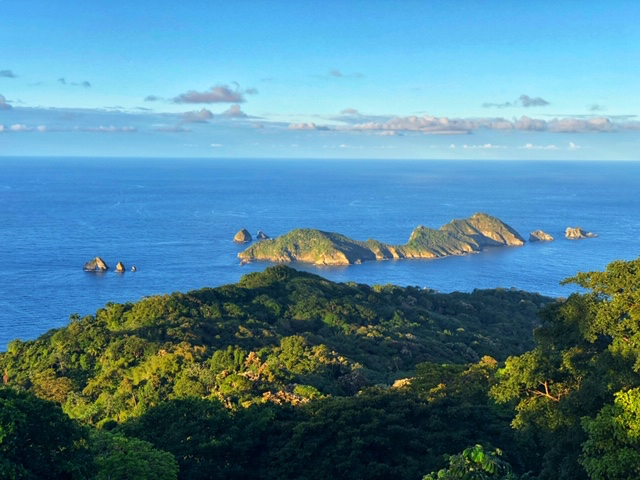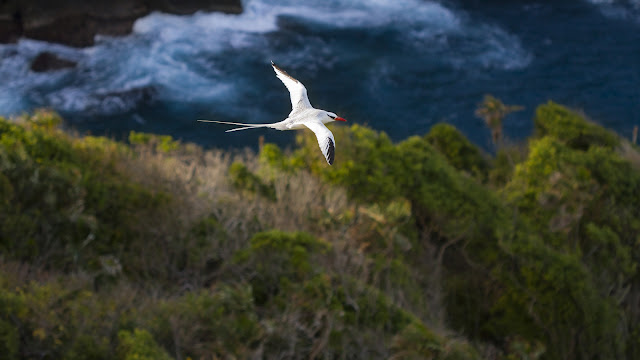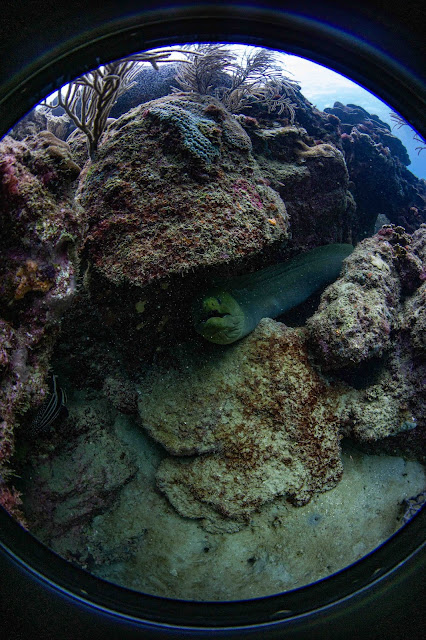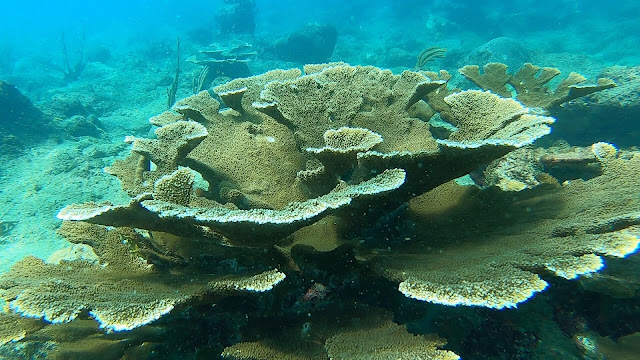Stepping up to the New Normal
Sometimes, only the wildest ideas can take
us out of ourselves with courage to face the gravest challenges. Pat Ganase
resorts to “blue sky thinking” with practical supports from marine scientist, Dr
Anjani Ganase.
The
people of Tobago may – at this point – be relatively unscathed by Covid-19. The
economy is in shambles but we have health! We are fortunate that our leaders closed
borders early; and we have not imported any infected persons for four weeks. With
the prioritized restart of commercial and industrial activities (announced by
the Prime Minister on May 9, 2020), borders may open with caution after the end
of June.
Many Tobago hotels have been posting friendly messages on their web pages about travel restrictions and re-booking; about extra care in cleaning procedures and sanitization. Will this messaging cut it to bring international visitors this far south on the Caribbean archipelago?
What
about the countries that are our markets? Unfortunately we remain connected to a
world in distress. It took years to find the vaccine for smallpox and many more
decades to eradicate it. So let’s be sure of one thing: we must be prepared to
live with Covid-19 for some time.
The
cruise ship industry is dead in the water; we don’t want a cruise ship anywhere
in our exclusive economic zone. Airplanes are grounded, and even when aviation
restarts – after the layoffs and other cost-cutting measures – it will be on a
needs basis. Leisure travel may not recover for many more months; and may
indeed return to the luxury it was a generation ago. The need to physically distance passengers in
the aircraft will necessarily make travelling by air more expensive. (It might
allow a return to heftier baggage allowances!) Who will afford to travel to
Tobago?
There
will be no hordes of foreign visitors coming for jazz festival, jouvay on the
bay, golf by the beach, birding in the rainforest, eco-adventures, authentic
village experiences, dirt-oven baked bread and cocoa tea. We are fortunate that
Trinidadians have become accustomed to staycations; and Tobago is a favourite
destination. So there’s the first opportunity.
If I
were a business owner on Tobago, I would seriously consider my options. After
the last four weeks, I would have pulled my shareholders, board of directors,
friends and family for a huddle – by zoom or other on-line facility of course. The
challenge is not to re-organise for the re-opening of a tourist season. Let us
consider re-organising to the very first
principles of business in an island economy for survival.
What
does survival mode in Tobago look like? Do we expect to be bailed out by
government? How long might we expect to be supported? How can we help ourselves so as not to squander the support?
 |
| Fort King George overlooks Rockly Bay, the site of many battles for Tobago. Photo by Anjani Ganase |
Re-opening the borders
While
we try to wean away from our dependency on imported clientele, let us reduce
our expenses in other areas – food import and energy costs. We acknowledge
there must be some inflow of foreign exchange into our country. However, the
threat for both the business owner and the governing body THA is a risky future
with pandemics spread by international travel. So how do we make our destination worth the risk
and even essential but still safe for nationals and visitors? To do this we need to shift our market focus
to, for example, long stay visitors, where travelers can be vetted beforehand, similar
to a long-stay VISA process that looks at health and travel history etc.
The
next step is figuring out the attractions for long-stay visitors. What would
they come to Tobago for? What about university students doing a semester
abroad? Or researchers setting up lab experiments. What about persons in the
film and TV industry who may need to be on set for months?
The
infrastructure needed must be scientific and flexible with facilities for
research including basic labs, temporary offices and plug in stations (with the
latest tools and tech. We need to be at the forefront of digital technology and
communications. The island should be covered by wifi.
Do the Math!
Here’s
a quick and simple SWOT (Strengths, Weaknesses, Opportunities, Threats) analysis
for a hotel of say 70 to 100 rooms.
STRENGTH:
Property with facilities to support accommodation and catering; some land space
for growing food; staff capable of servicing visitors; existing credible
business owners/managers capable of networking with appropriate partners,
bankers and investors.
WEAKNESS:
limited/ no access to international market; low recognition in the local
(Trinidad) market.
THREATS:
employees laid off; reluctant business partners; limited support from
government and agencies
OPPORTUNITY:
at a time when economic activity is lowest, the sky’s the limit. Here are some options:
·
Create communities around your properties: this
will ensure your survival and that of your neighbours: encourage food gardens;
share communal kitchens; teach, learn and grow together.
·
Convert the business to accommodate long-term
(most likely local or regional) stays with a few rooms reserved for the international
market if/ when it opens up; keep skilled persons in employment and retrain if
possible.
·
Collaboration is the new competition: seek local
partnerships with the TT film association, The Slow Food movement, UTT, UWI and
other universities regionally and internationally, educational NGOs, private
schools etc.
·
Partner with university or learning (local or
international) institutions to create a Tobago campus: agricultural,
conservation and marine sciences are urgently required for Tobagonians.
·
Become a partner in a film-making project or
television industry: creative film-makers need partners that can provide
property (for sets), accommodation and catering. A reality tv show or a cooking
show could attract an international syndicate (Fox or Disney)
·
Partner with a learning institution for a school
of arts: culinary arts, yoga, surfing, Carnival arts.
·
Partner with an existing Tobago business, for
example a dive operator to pursue sustainable marine research and development.
·
Create a centre for marine or protected area
management; with museum and interpretive presentations.
 |
| Fisherman sets out in his pirogue; artisanal fishing must be supported. Photo by Anjani Ganase |
Tobago House of Assembly
If
the private sector goes aggressively into the new normal, what should be the functions
of the THA in the new order? Can the Tobago House of Assembly use its influence
to facilitate transformation and encourage innovation and a leap into the
future?
Let’s
do a SWOT analysis on this governing body.
STRENGTH:
administration; governing body, institutional network (banks, authorizing
agencies etc)
WEAKNESS:
requires regular injections of money from central government
THREATS:
loss of political power; island ecosystems threatened by climate change (coral
reefs, sargassum, degradation of environment); loss of natural resources,
beaches, fisheries, forestry reserves, fresh water
OPPORTUNITY:
leadership by example and use of existing assets to diversify the economy while
securing livelihoods. Some projects include
·
Convert Cove Estate into a learning and research
institution for new and innovative industries: alternate energy from wind, wave
or solar; conversion and use of sargassum.
·
Utilise Louis d’Or farm and nurseries (and
agricultural expertise) as a centre for seeding home agricultural holdings all
over Tobago
·
Create a food forest at Les Coteaux against the
annual degradation and bushfires
·
Protect the island’s freshwater supply by
extending the Main Ridge Forest Reserve to include the Southern
Main Ridge (along the Bloody Bay-Parlatuvier Main Road) and the Northern Main
Ridge.
·
Institute
the Protected Areas Plan with the North East Tobago Marine Protected Area.
·
Manage Buccoo Reef Marine Park as a model for rehabilitation
and sustainable use.
·
Facilitate new businesses being created in
existing properties.
·
Establish scholarship programmes to develop
trades/ skills in the necessary fields
Ideas and Inspiration
This
is an ideas bank. Some ideas can be instantly initiated; others may take months
to start. There may need to be two or three year plans broken into “phases” to
become operational. In the meantime, people will need to live. Encourage
community strengthening through food: agriculture, fishing, green markets.
Acknowledge the potential of the private sector and business owners as leaders
to restart enterprise. The goodwill that
can be created within communities around business owners leading towards a new
vision can be empowering.



